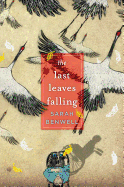
As soon as Sarah Benwell's exquisite debut novel opens, readers know that narrator Sora, 17, is dying of ALS (amyotrophic lateral sclerosis, also known as Lou Gehrig's disease). The ending of this story is not in question. What makes Sora's journey so all-consuming for readers is the way he grapples with the question of how to live the days he has left. In many ways, Sora's story is a guide to living a meaningful life, and the importance of family, friendship and self-knowledge.
Benwell crafts her novel with the spareness of haiku. She uses Sora's observations of nature to convey his feelings in a way that never seems ponderous. The book takes place in the fall, when warm days grow rare and days shorter. Nature's beauty is more meaningful for its fleetingness. Sora views the Kyoto park he loves from the bridge, watching for his favorite koi, Emperor Fish; its elusiveness and appearances reflect Sora's fluctuations in moods, his good and bad days.
An obligatory visit from two popular classmates whom Sora doesn't know well motivates him to do two things: to sign up for a chat room and to research why people overlook and discount people with disabilities. In the chat room, he meets Mai and Kaito, and though Sora at first resists his mother's pressure to invite them over for dinner, he agrees. However, he does not warn them about the wheelchair-bound host they will meet. That first dinner does not go well, but the trio's resolve to be completely honest going forward takes their friendship to ever deeper levels.
Readers see Dr. Kobayashi, Sora's counselor, only from Sora's point of view, but will perceive in ways Sora cannot how carefully she weighs her words. She supports Sora, while still being realistic and compassionate. She gives Sora a book, Death Poems: Last Words of the Samurai, and the poems put into words the complex ways in which one looks at life when fated to die. "On journey long/ I stop to rest and watch/ the end of days," reads an 1825 verse by Kaida. This one by Tokaido, dating back to 1795, especially moves Sora: "Words/ are mere distraction--/ Death is death." Dr. Kobayashi reminds him, gently, that everyone dies: "The samurai... they knew this. You can see it in their words, right?" she says. "What matters is not how much time you have, but how you use it." The echoes of these poems remain with Sora and buoy him throughout his days, reminding him that he is not alone in his desire to live and his need to accept life's end.
Sora finds compassion for his mother, on whom he must rely to a greater degree each day--to get meals, to get dressed and, by the end, to get out of bed. He resents his loss of independence but learns to accept her help with grace. Through Sora's eyes we watch her struggle with her son's illness--sometimes needing to leave the table or the room, but always returning, always there for her son. One of the most moving moments in the novel occurs when Sora is starting to depend on her more and more, and he asks, "When I was small, what did you dream I'd become?" She recounts a memory from when he was three years old and made cupcakes with his grandmother Baa-Baa. For weeks, three-year-old Sora told everyone how to make cupcakes, step by step. "I knew right then that you would teach, one way or another," his mother tells him. In that moment, Benwell shows readers that Sora has been living his vocation all along.
In his friendships with Mai and Kaito, he learns as much from them as they do from him. They are teaching each other about what's important in life. Mai's mother wants her to become a lawyer. Mai is a gifted artist and has no desire to be a lawyer. Sora urges her to tell her mother how she feels. Mai says, "[E]very time I think of pulling out I think of you, and all those schools, their history and dusty stupid books, and how you should be there.... and you won't, but I can and... I have to go. Don't you see?" Sora responds, "That's my dream, not yours.... The last thing that I want is for you to wear a dream that doesn't fit." Through these conversations, we watch all three friends grow with the dawning reality of Sora's brief remaining time.
Sora's relationship to his grandparents and the love they give him also boost his spirits. He and his mother make a trip to visit his grandparents, and Baa-Baa makes omuraisu for Sora: fluffy rice, peas and carrots, sometimes ham, stirred in ketchup, wrapped in a thin, light omelet. Readers can almost taste the love in which she wraps Sora's favorite meal. Benwell appeals to all of the senses as she describes this treat. His Ojiisan (grandfather) opens an e-mail account, and their exchanges are both deep and funny, mimicking the rhythms of life.
Benwell's elegant economy of language feels both true to the culture and to a teenager who's facing imminent death. Great pain makes us more attuned to beauty, and the desire not to waste time or words. Again, like a haiku, the author closes with a beautiful surprise, one that lifts the three friends'--and readers'--to a new level of understanding. --Jennifer M. Brown

